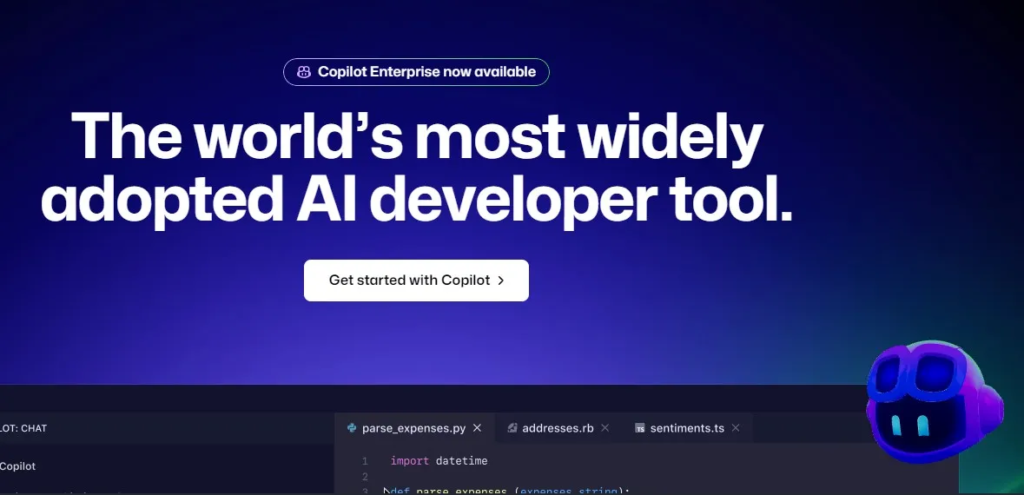
(Image credit: Copilot)
GitHub Copilot: Your Ultimate Coding Assistant
Reasons to Buy:
- Seamless integration with popular IDEs for enhanced productivity
- Flexible subscription tiers catering to different user needs
- Powered by OpenAI’s advanced GPT-4 model
- Unlimited interactions across all subscription levels
Reasons to Avoid:
- Requires a subscription for access
- Cannot be self-hosted
- Potential for occasional inaccurate suggestions
GitHub Copilot, initially launched in October 2021 as a version of Microsoft’s Copilot LLM, has evolved into a powerful tool tailored to boost efficiency and productivity for developers. Originally leveraging OpenAI’s Codex model (a modified GPT-3), GitHub Copilot upgraded to the more sophisticated GPT-4 model in November 2023.
Central to GitHub Copilot’s appeal is its direct integration with leading Integrated Development Environments (IDEs) such as Visual Studio Code, Visual Studio, Vim, Neovim, JetBrains IDEs, and Azure Data Studio. This integration allows Copilot to access and utilize your existing project files seamlessly, enhancing its ability to provide accurate and context-aware coding suggestions. For enterprises, GitHub Copilot can integrate with internal repositories and knowledge bases, further refining its suggestions to align with organizational standards.
When using GitHub Copilot, developers can benefit from its versatile approach to code assistance. It can generate code blocks from prompts embedded within inline comments, leveraging project-specific context for more precise outputs. Additionally, real-time suggestions as you type ensure efficient coding practices, offering autocomplete functionalities tailored to various coding tasks. The GitHub Copilot Chat extension extends this capability by enabling interactive queries, debugging assistance, and context-aware feedback, making it a valuable companion throughout the coding process.
GitHub Copilot is trained extensively on publicly available code repositories hosted on GitHub, covering a wide array of programming languages and coding paradigms. While it aims to assist in any language with sufficient repository data, the quality of suggestions can vary based on the dataset’s depth. To mitigate risks, all subscription tiers include a public code filter to prevent direct copying of code snippets from public sources. Moreover, business and enterprise users can exclude their data from further model training and customize data handling preferences as per organizational policies.
Despite efforts to maintain data privacy, GitHub Copilot processes prompts externally, necessitating consideration of data security implications. Users should exercise caution when relying on automated suggestions, as occasional inaccuracies or suboptimal outputs can occur. Always review generated code to ensure it meets project requirements and expectations.
Looking forward, GitHub may enhance Copilot by adopting the GPT-4o model, released in May 2024, which promises improved efficiency and operational costs. While no official upgrade announcement has been made, potential enhancements could further elevate Copilot’s performance and accessibility.
For those interested in exploring GitHub Copilot, a free 30-day trial of the basic package is available, followed by a $10 monthly subscription fee. Business and enterprise plans, priced at $19 and $39 per user per month respectively, offer enhanced features tailored to organizational needs.
Enhance Your Coding Workflow with GitHub Copilot
Discover how GitHub Copilot can streamline your coding experience with its powerful AI capabilities and seamless integration with your favorite development tools.
Start your free trial today and experience firsthand the future of coding assistance.

